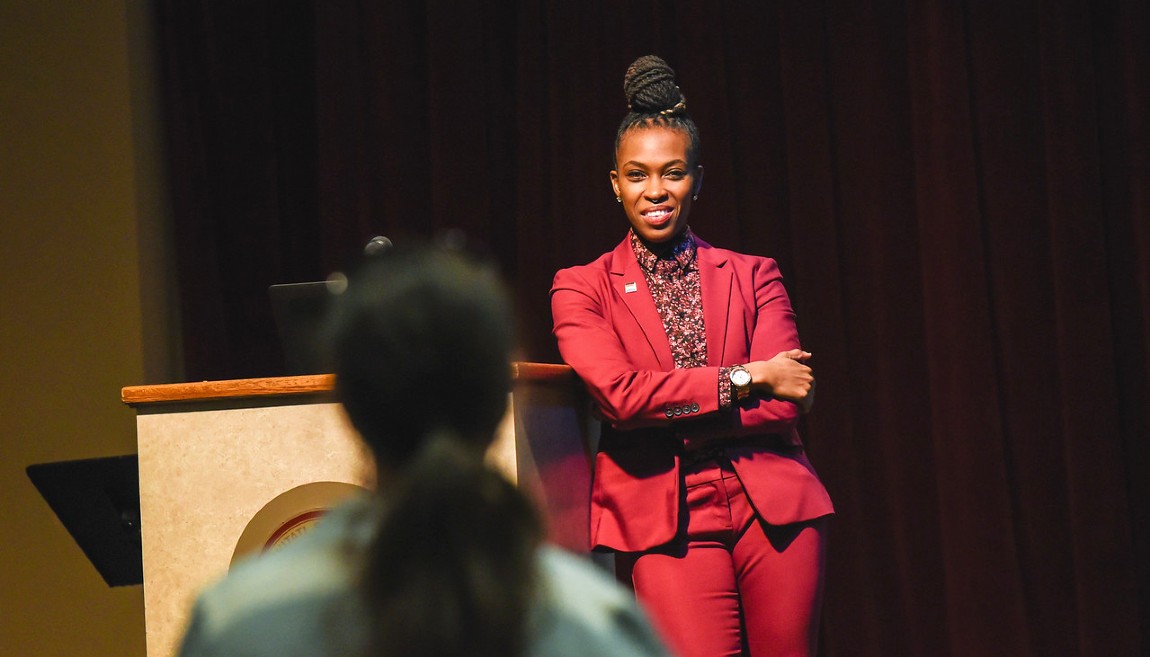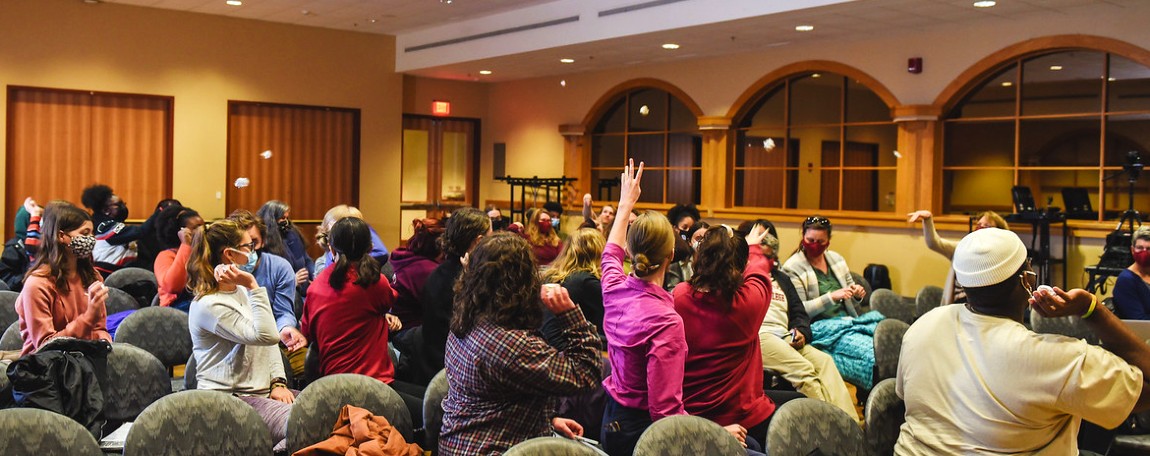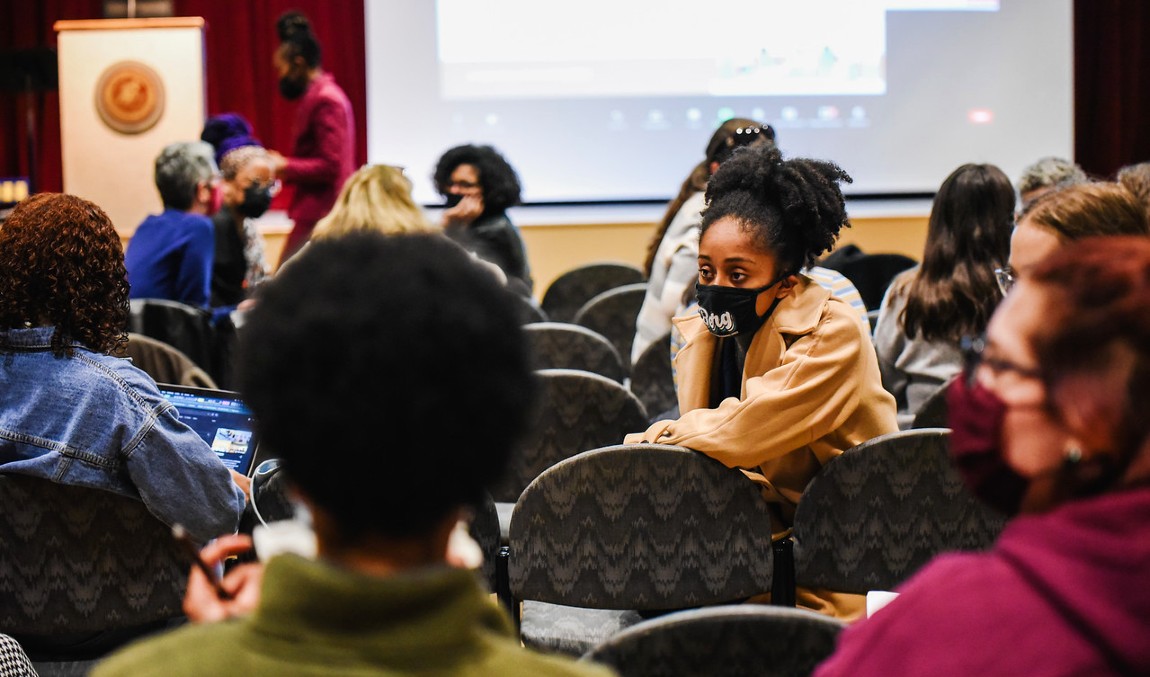Intersectional Advocacy and Activism
The American Civil Liberties Union’s first Chief Equity and Inclusion Officer Amber Hikes Speaks at Muhlenberg.By: Kristine Yahna Todaro Thursday, November 18, 2021 11:15 PM
 The ACLU's Chief Equity and Inclusion Officer Amber Hikes, who led a campus talk in November, also gave a virtual keynote address at Muhlenberg’s Black History Month program in February. Photos by Kristi Morris, Littlewing Photography.
The ACLU's Chief Equity and Inclusion Officer Amber Hikes, who led a campus talk in November, also gave a virtual keynote address at Muhlenberg’s Black History Month program in February. Photos by Kristi Morris, Littlewing Photography.What does it look like to put intersectionality advocacy into action?
A story shared by Amber Hikes, the ACLU’s Chief Equity and Inclusion Officer, in the Seegers Union Event Space and via Zoom the evening of November 17, provides an example.
Several years ago, Hikes was working with a student group planning a march to draw attention to catcalling on a college campus. In the planning meetings, the women of color in the group expressed concerns about their physical safety and requested additional lighting on pathways. Women of color typically experience higher rates of catcalling and heckling, according to Hikes, and so are put in more danger when this type of behavior goes unchecked.
“What this conversation made clear is that if we're using an intersectional lens—where as a group, we’re prioritizing the needs of those most impacted by an issue—we realized we needed to shift both the focus and the approach to the problem,” says Hikes. “So instead of just doing a march as originally planned, the group also successfully advocated for safer campus lighting.”
Hikes, who comes from an activist organizing background, says it’s important to connect people to spaces so “there's no decision about us without us.” She adds, “Whether it's a classroom, dining room or Zoom room, examine who's there and who's not. Then ask, how can I use my privilege to open up opportunities for change and progress. There is nothing we accomplish alone that is better, stronger or more sustainable than what we can do together.”

Sharing advocacy and activism ideas.
During her interactive presentation at Muhlenberg, “Discussing Intersectional Advocacy and Activism,” which was hosted by the Africana Studies Program, Hikes asked students, faculty and staff to think about an advocacy issue that needs addressing or an activism project they want to get started on. Attendees scrawled their ideas on pieces of paper, crumpled them up and then had a “snowball fight,” batting the scraps around until they were thoroughly mixed. Everyone grabbed a paper, sorted themselves into teams of four and read the ideas to each other, looking for themes and offering up advice and current resources to address the issues.
Ideas that emerged included creating an anti-racist book club for white students, more actively amplifying the voices that are often silent in campus conversations and increasing diversity in clubs and club leadership so members of affinity groups feel welcome and less tokenized.
Hikes then led the group in a self-reflection exercise called KISS, which focused on individual responsibility and accountability. Participants wrote down their intentions in four categories: those they wanted to keep (one example, “reaching out to people who are different than me”), increase (“environmental justice work”), start (“being more assertive and really speaking my truth”) and stop (“saying that I can’t do something or don’t belong because of my Blackness”).
“Start with empathy,” said Hikes. “Just starting, just doing one thing, is powerful.”

In addition to the Africana Studies Program, the event was sponsored by the Women's & Gender Studies Program; the Dean of Students' Office; the Office of the Dean of Academic Life; the Office of Community Engagement; the Office of Multicultural Life; the Office of the Associate Provost; the Office of Prevention Education; the Emerging Leaders Program; and the Lectures and Forum Committee.
